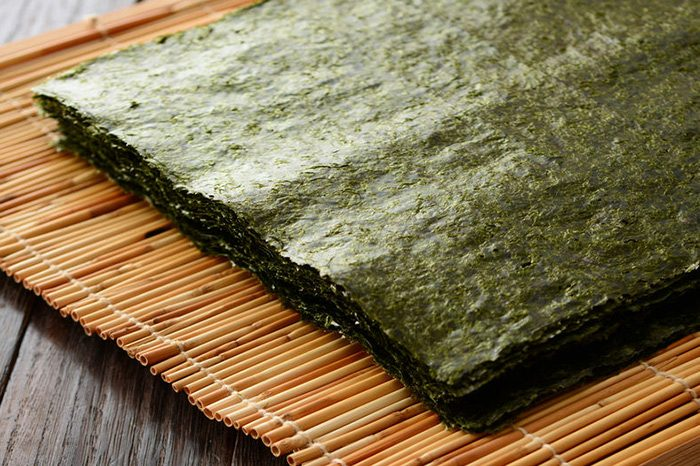Sushi nori, a fundamental ingredient in Japanese cuisine, is a type of seaweed that plays a crucial role in the preparation of sushi. This edible seaweed, primarily harvested from the Pacific and Atlantic Oceans, is known for its unique flavor, texture, and nutritional benefits. Nori is made from the red algae species Porphyra, which is cultivated, harvested, and processed into thin sheets that are used to wrap sushi rolls or as a garnish for various dishes.

The process of making sushi nori is meticulous and requires a deep understanding of the seaweed’s growth cycle. Farmers cultivate nori on ropes submerged in clean, nutrient-rich waters. The algae grow rapidly, and once harvested, they are washed, shredded, and spread out to dry in thin layers. The drying process is crucial, as it helps to preserve the seaweed’s vibrant green color and enhances its flavor. Once dried, the sheets are toasted to bring out a rich umami taste, making them a perfect complement to the vinegared rice and fresh ingredients used in sushi.
Nori is not only valued for its culinary uses but also for its impressive nutritional profile. It is low in calories and high in essential vitamins and minerals, including vitamins A, C, E, and K, as well as iodine, calcium, and iron. Additionally, nori is a good source of protein and dietary fiber, making it a healthy addition to various diets. Its high antioxidant content also contributes to overall health, helping to combat oxidative stress in the body.

In sushi preparation, nori serves multiple purposes. It acts as a wrapper for sushi rolls, holding together the rice and fillings, which can include fish, vegetables, and other ingredients. The texture of nori adds a delightful crunch, while its flavor enhances the overall taste of the sushi. Beyond sushi, nori can be used in other dishes, such as soups, salads, and rice balls, or even enjoyed as a snack on its own, often seasoned with salt or other flavorings.
The popularity of sushi nori has transcended Japanese cuisine, becoming a staple in many parts of the world. Sushi restaurants and home cooks alike appreciate its versatility and ease of use. With the rise of health-conscious eating, nori has gained recognition as a nutritious food option, leading to an increase in its availability in grocery stores and specialty markets.
In conclusion, sushi nori is more than just a wrapping for sushi; it is a vital ingredient that contributes to the flavor, texture, and nutritional value of various dishes. Its rich history, meticulous production process, and health benefits make it a beloved component of Japanese cuisine and a global culinary favorite. Whether enjoyed in a traditional sushi roll or as a standalone snack, nori continues to captivate food lovers around the world.
Contact:
Beijing Shipuller Co., Ltd.
WhatsApp: +86 178 0027 9945
Web: https://www.yumartfood.com/
Post time: Dec-04-2024